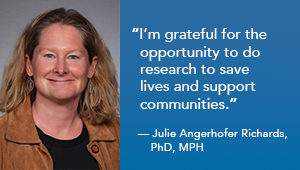Julie Richards, PhD, MPH
Biography
Julie Angerhofer, PhD, MPH, is passionate about improving care for mental health and substance use in partnership with people who provide and receive health care. She applies qualitative methods to inform what research questions we should be asking and how we should consider answering them. She employs statistical methods to inform implementation evaluations with a goal of optimizing care delivery and improving clinical practice effectiveness and patient outcomes.
Dr. Richards recently received grants from the Centers for Disease Control and Prevention and the American Foundation for Suicide Prevention to research firearm suicide prevention in health care systems via user-centered design and community-based participatory research. She also collaborates with multidisciplinary teams on a variety of mental health and addiction research projects, supports care delivery research partnerships, and mentors students at the University of Washington as an affiliate assistant professor.
Research interests and experience
-
Suicide Prevention
-
Alcohol and Drug Use
-
Behavior Change
Firearm injury prevention; alcohol and drug misuse; tobacco cessation
-
Mental Health
Depression; alcohol and drug use disorders; suicide prevention; self-management
-
Social Determinants of Health
Stigma
-
Health Services & Economics
Quality improvement, implementation cost
-
Preventive Medicine
Public and population health; screening effectiveness and uptake; evidence-based practice recommendations
-
Implementation Research
-
Addictions
Prevention and treatment
Sparc trial tools
Resources for behavioral health integration
The SPARC trial successfully implemented behavioral health care into primary care. On our website, you can access tools for behavioral health integration, as well as frequently asked questions and publications.
Recent publications
Simon GE, Stewart CC, Richards JE, Ziebell R, Lapham GT, Hoopes AJ. Accuracy of self-report questionnaires and records-based risk scores to identify adolescents' risk for self-harm. Psychiatr Serv. 2025 Mar 19:appips20240427. doi: 10.1176/appi.ps.20240427. Online ahead of print. PubMed
Rossom RC, Crain AL, Bart G, Richards JE, Boggs JM, O'Connor PJ, Borgert-Spaniol C, Kane S, Hooker SA. Randomized pilot of a clinical decision support tool to increase suicide screening for at-risk primary care patients with opioid use disorder. AJPM Focus. 2024 Oct 2;3(6):100280. doi: 10.1016/j.focus.2024.100280. eCollection 2024. PubMed
Penfold RB, Yoo HI, Richards JE, Crossnohere NL, Johnson E, Pabiniak CJ, Renz AD, Campoamor NB, Simon GE, Bridges JFP. Acceptability of linking individual credit, financial, and public records data to healthcare records for suicide risk machine learning models. JAMIA Open. 2024 Oct 21;7(4):ooae113. doi: 10.1093/jamiaopen/ooae113. eCollection 2024. PubMed
Angerhofer Richards J, Cruz M, Stewart C, Lee AK, Ryan TC, Ahmedani BK, Simon GE. Effectiveness of integrating suicide care in primary care: secondary analysis of a stepped-wedge, cluster randomized implementation trial. Ann Intern Med. 2024 Oct 1. doi: 10.7326/M24-0024. [Epub ahead of print]. PubMed
Boggs JM, Yarborough BJH, Clarke G, Aguirre-Miyamoto EM, Barton LJ, Beck A, Bruschke C, Buttlaire S, Coleman KJ, Flores JP, Penfold R, Powers JD, Richards JA, Richardson L, Runkle A, Ryan JM, Simon GE, Sterling S, Stewart C, Stumbo S, Quintana LM, Yeh HH, Ahmedani BK. Development and validation of electronic health record measures of safety planning practices as part of zero suicide implementation. Arch Suicide Res. 2024 Aug 28:1-14. doi: 10.1080/13811118.2024.2394676. [Epub ahead of print]. PubMed
Research

Suicide attempts decreased after adding suicide care to primary care
Safety planning and risk screening improved outcomes for adult patients.
Research

Understanding adoption of Lock to Live, a decision aid supporting suicide prevention
KPWHRI research finds ways to increase use of a firearm safety tool.
News

Kaiser Permanente expands gun violence prevention work
Equity-focused research by Julie Angerhofer Richards, PhD, MPH, is among the work supported by $3.2 million.
KPWHRI in the media
Suicide care in primary care reduces suicide attempts
Primary care intervention might reduce suicide attempts
MedPage Today, Sept. 30, 2024



